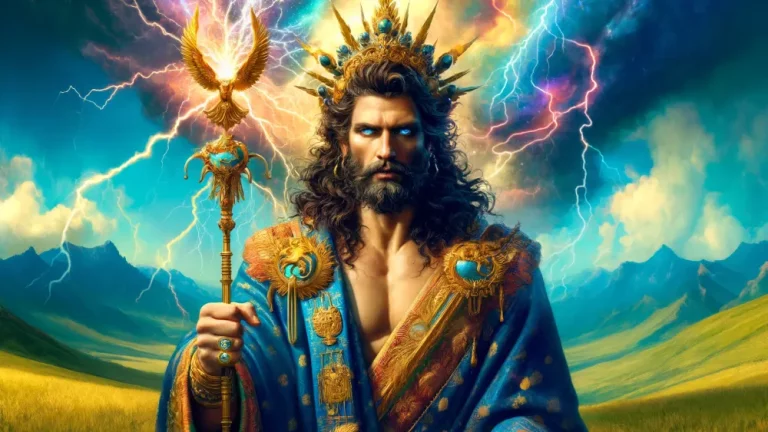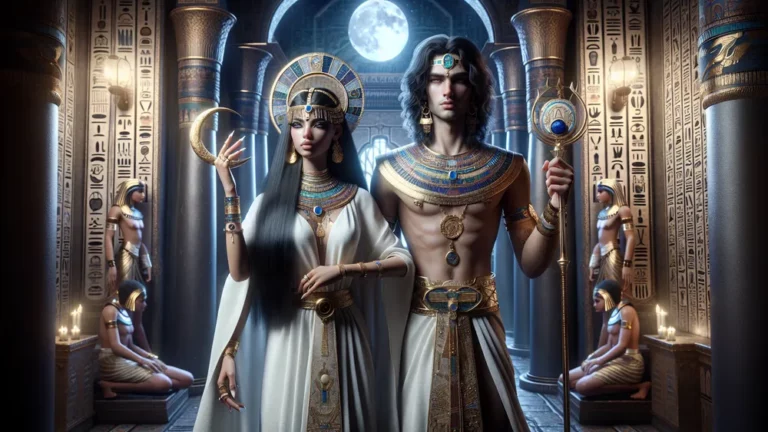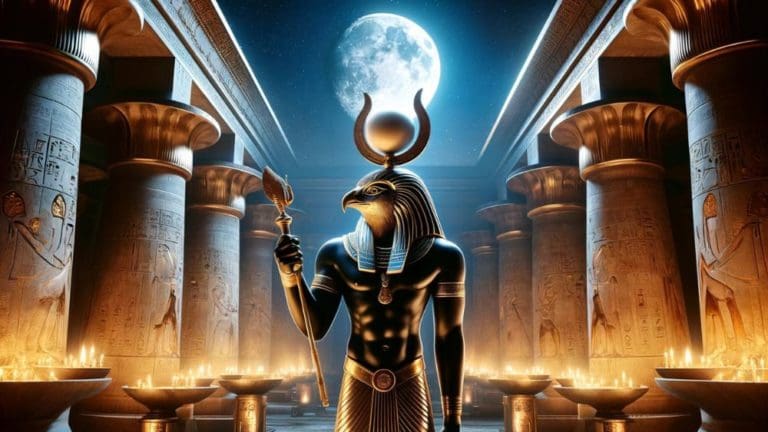Atalanta: Greek Mythology’s Swift Huntress And Heroine
Welcome to the interesting place of Greek mythology, where gods, heroes, and unusual beings come alive through classic stories. Today, let’s look at Atalanta’s story, a notable character who stands out in a mostly male mythological setting. Imagine this: a world where a young girl, left when she was born, is raised by a she-bear and later becomes one of the top huntresses of her time.
Key Points:
- Atalanta is a notable figure in Greek mythology.
- She was the daughter of King Iasus and Clymene from Arcadia.
- Abandoned at birth for being a girl, she was raised by a she-bear.
- Later, hunters found and trained her in hunting skills.
- Atalanta participated in the Calydonian Boar Hunt and was the first to injure the beast.
- She challenged suitors to a race, with death as the penalty for losing.
- The golden apples helped Hippomenes win the race, leading to their tragic end.
Atalanta’s story isn’t only about her incredible speed and skill but also about her toughness and independence. As we explore her life, we will cover her beginnings, her childhood, her famous deeds, and her long-lasting impact on both old and modern culture. If you know a lot about mythology or are just starting, Atalanta’s story is great. It will inspire you.
Atalanta: Overview and Key Facts
| Key Point | Description |
|---|---|
| Name | Atalanta |
| Origin | Arcadia, a place in Greece |
| Parentage | Child of King Iasus (or Schoeneus) and Clymene |
| Being Left | She was left on a mountainside by her dad because she was a girl |
| Saved | Taken care of by a she-bear and later found by hunters |
| Growing Up | Hunters raised her, and she became good at hunting |
| Notable Traits | Very fast, agile, and skilled in hunting |
| Famous Feats | She took part in the Calydonian Boar Hunt and won a running race against suitors |
| Help from Gods | Aphrodite helped with golden apples during the race with Hippomenes |
| Turned into Animal | She became a lion with Hippomenes as a result of godly punishment |
| Meaning | Means female strength and independence |
| Impact on Culture | Influenced many works in books, art, and today’s media |
Getting to Know Atalanta
To fully understand Atalanta’s amazing story, let’s look at her beginnings and what made her special.
Who is Atalanta?
Atalanta is an interesting figure in Greek myths, famous for her amazing speed, agility, and hunting skills. She came from Arcadia and was the daughter of King Iasus (or Schoeneus) and Clymene. Unlike many heroes in myths who were mostly men, Atalanta made a unique place for herself as a female hero in a world dominated by males.
Imagine a young girl who, despite being left at birth because she was a girl, grows up to challenge and surpass many male heroes of her time. Her story isn’t solely about physical actions but also about challenging and changing societal norms.

Atalanta’s story connects with the struggles and successes of modern-day women who do well in areas traditionally dominated by men, making her a lasting symbol of female strength and independence.
Atalanta stands out in Greek myths as a remarkable female hero, known for her speed and hunting skills, who defied societal norms by excelling in a male-dominated world.
Atalanta’s Early Days
To see how Atalanta became the famous person she is, we should look at the early days of her life. It starts with her birth. Many unusual things followed.
Birth and Abandonment
Atalanta’s story starts with her birth to King Iasus (or Schoeneus) and Clymene in Arcadia. Her father was upset that she wasn’t a boy, so he decided to leave her on a mountainside. This was a usual story in old myths for unwanted kids. Think of a newborn left alone, vulnerable. In the wilderness. But then, luck appeared. A she-bear found her.
Instead of hurting her, the bear nursed and protected her like one of her own cubs. This amazing rescue by the bear not only helped Atalanta survive but also let her grow up with the wild’s strength and instincts. Because of this, she became a strong huntress later.
How She Grew Up with Hunters
After the she-bear cared for her, Atalanta was later found by some hunters. They took her in and raised her. Think of a kid getting taken in by pro athletes. Similarly, these hunters gave their skills and knowledge to her. They taught her hunting, tracking, and survival. They trained her. She got really good.
The hard training and the wild environment made her strong. These things mixed wild instincts with exact techniques. Her unique upbringing not only gave her top hunting abilities but also got her ready for many challenges in her legendary adventures.

Atalanta’s Skills and Traits
Growing up with hunters and in the wild, Atalanta learned many things. Her skills were amazing. These things made her different from other Greek heroes.
Amazing Speed and Agility
Atalanta’s speed and nimbleness were very famous, often like the fastest animals and heroes in Greek stories. Think of a top sprinter who could run faster than animals; that was Atalanta’s skill. Her amazing skills were proven in many well-known feats:
- Outrunning Suitors: Atalanta challenged her suitors to a race. She was sure none could match her speed. If they lost, they died. This showed how fast she was.
- Calydonian Boar Hunt: During this well-known hunt, Atalanta was the first to hurt the giant boar, showing not only her speed but also her precision and nimbleness.
- Comparison with Hermes: People often said Atalanta’s speed was like Hermes, the messenger god with winged shoes. This showed she could move quickly and easily.
These actions and comparisons show how Atalanta’s speed and nimbleness made her one of the most notable people in Greek stories.
Her Hunting Expertise
Atalanta’s hunting skills were unmatched, making her one of the toughest huntresses in Greek mythology. Think of a top archer or tracker today, someone whose abilities are very sharp; that was Atalanta’s ability. She used a bow and arrows with great skill, hitting her targets without missing.
Her ways included sneaking quietly and planning, so she could get close to her prey without making a sound and hit them well. She was also very good with a spear. She used it to bring down bigger animals with strong and skilled moves. Growing up with hunters gave her a deep understanding of the wild.
She could read tracks, know how animals acted, and move easily in rough places. These skills made her a great huntress and helped her in her many famous adventures.
Famous Stories and Legends
Atalanta’s amazing talents and qualities led her to be part of many famous tales in Greek myths.
The Calydonian Boar Hunt
The Calydonian Boar Hunt was one of the most well-known events in Greek stories. It was like a big game hunt today, only much more dangerous. The giant boar, sent by Artemis to cause problems in Calydon, was a very tough beast. It needed the best hunters in Greece to get together. Atalanta was the only woman among these top hunters.
She was very important in this dangerous hunt. Her excellent hunting skills appeared when she was the first to hurt the boar. This first wound made the boar weaker, which allowed the other hunters to kill it later. Because of this, Atalanta earned respect from her male partners. Meleager, the leader, gave her the boar’s hide for her big contribution.
This caused disagreements but showed how key her role was in making the hunt successful.

The Calydonian Boar Hunt featured the skilled Atalanta, the only woman among top hunters, who played a crucial role by wounding the giant boar, leading to its eventual defeat and earning her respect.
The Race with Hippomenes
Atalanta was well-known for her unmatched speed, and she had a tough test for her suitors: any man who wanted to marry her must beat her in a footrace. If they lost, they would die. This test wasn’t just about running fast; it also meant Atalanta wanted to stay free and not owned by any man.
Hippomenes, a suitor, knew he couldn’t win by speed alone, so he asked Aphrodite, the love goddess, for help. She gave him three golden apples that had magical charm, meant to distract Atalanta during the race. When the race began, Hippomenes used the golden apples cleverly. Each time Atalanta got close to passing him, he would throw one.
The shiny, irresistible apples made Atalanta slow down to pick them up. This clever trick helped Hippomenes stay ahead and win the race. But their story didn’t end there with winning. In their excitement, they forgot to thank Aphrodite, making her very angry.
Because of this, they were turned into lions, animals the Greeks believed couldn’t mate with each other, which was a punishment that made their union pointless.
Aphrodite’s Role
Aphrodite, the goddess of love and beauty, had a key part in the race between Atalanta and Hippomenes by giving Hippomenes three golden apples. These apples were not just fruits but had special powers, filled with a strong attraction meant to distract Atalanta during the race. Each time Atalanta saw an apple, she slowed down to pick it up. The importance of these apples can be broken down as follows:
- Divine Distraction: The apples served to take Atalanta’s attention away, making her go slower and giving Hippomenes the edge.
- Symbol of Temptation: They showed how even very focused people can get sidetracked by tempting things.
- Tool for Winning: Without these golden apples, Hippomenes couldn’t have won, highlighting the critical role of divine help in Greek stories.
Aphrodite’s involvement highlights the idea of love and want, showing how gods can deeply affect human events.
What Happened After the Race
After Hippomenes won the race with the help of Aphrodite’s golden apples, he and Atalanta got married, meeting the requirement set by Atalanta for her suitors. However, their story turned tragic because they did not thank Aphrodite properly for her help. Because they ignored her, Aphrodite’s anger was harsh. She turned Atalanta and Hippomenes into lions.

Greeks believed lions could not mate with their own kind. This change was a punishment: it made sure their marriage would be pointless, meaning the mistake of not showing gratitude to the gods had serious consequences.
What Atalanta Stands For and Her Influence
Atalanta’s story, full of amazing acts and help from the gods, has a big impact that goes beyond her mythological background. We should look at what she means and how she keeps inspiring people.
Symbol of Female Empowerment
Atalanta is a strong example of female strength and independence in Greek myths. Unlike many women in old myths who were seen as less important or secondary to male heroes, Atalanta created her own way. By excelling in hunting and athletics, she defied traditional roles.
Much like women today who break into areas like science, technology, and sports, her decision to challenge her suitors to a footrace, with the rule that losing meant death, emphasizes her independence and refusal to be controlled by society’s norms. Through her actions, her story means that women can be both strong and free, going against what society expects.
How She Inspired Later Culture
Atalanta’s impact has gone beyond old Greek myths, affecting many cultural works over history. Similar to how today’s icons inspire with their stories of overcoming hardship, Atalanta’s tale of independence and skill has been inspirational for many artists, writers, and thinkers.
People have shown her story in many kinds of art, from Renaissance paintings to modern books, representing the lasting appeal of a strong, independent female figure. For example, her character appears in current novels and movies that celebrate female empowerment and challenge usual gender roles. Atalanta’s influence is clear in the way her story keeps resonating, acting as a timeless reminder of the power and strength found in women.
Atalanta’s story has inspired many artists and thinkers throughout history, appearing in various forms of art and modern works that celebrate female strength and challenge traditional gender roles.
Pantheon of Greek Mythological Heroes and Figures
The group of Greek Mythological Heroes and figures is a collection of characters, each having their own unique stories and traits. Much like a modern-day group of superheroes, these figures include well-known names such as Hercules, Achilles, and Odysseus, each known for their amazing actions and adventures.
To see the full range of these interesting characters, you can check out this detailed list of all the Greek Mythological Heroes and Figures. This resource gives detailed info on each hero and figure. It offers a better understanding of their roles and significance in Greek mythology.
FAQs
1. Who were Atalanta’s parents?
Atalanta’s parents were King Iasus of Arcadia and Clymene.
2. Why was Atalanta abandoned at birth?
Atalanta was abandoned at birth because her father, King Iasus, desired a male heir and was disappointed to have a daughter.
3. What is the significance of the golden apples in Atalanta’s story?
The significance of the golden apples in Atalanta’s story lies in their use by Hippomenes to distract her during their race, ultimately leading to his victory and their subsequent marriage.
4. How did Atalanta’s story end?
How Atalanta’s story ended involves her transformation into a lion alongside her husband, Hippomenes, as a result of offending the gods.







